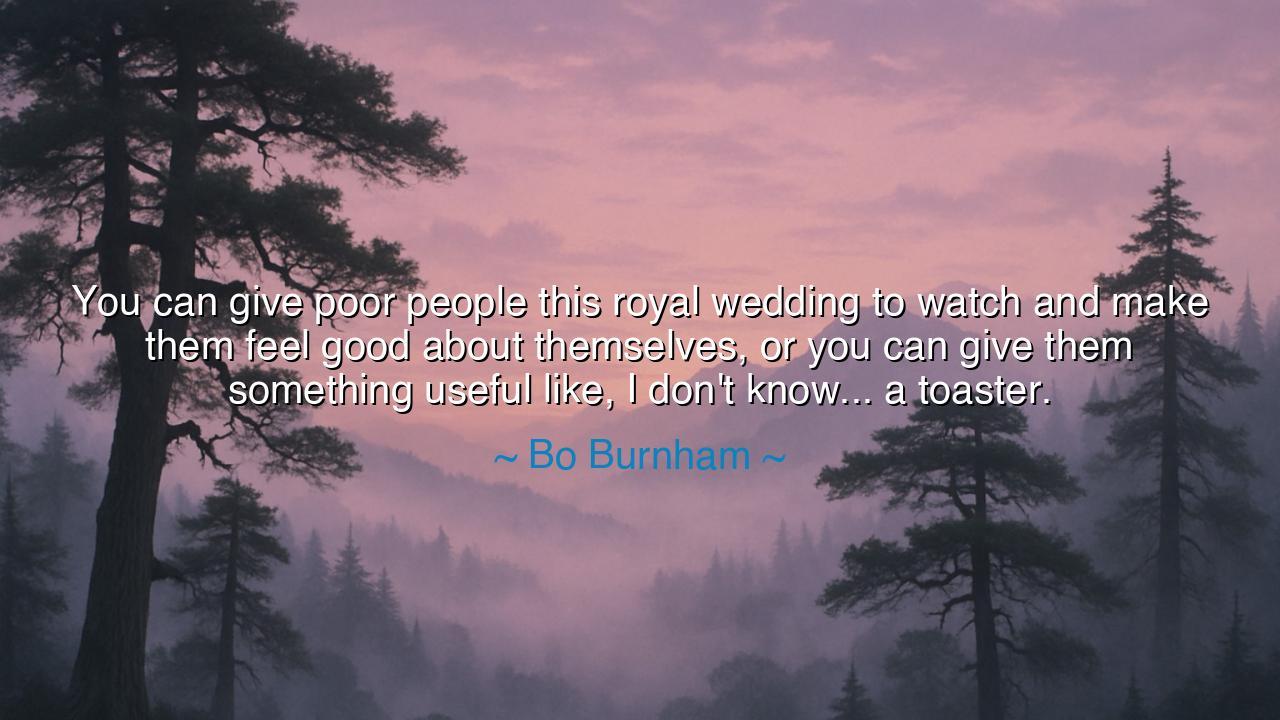
You can give poor people this royal wedding to watch and make
You can give poor people this royal wedding to watch and make them feel good about themselves, or you can give them something useful like, I don't know... a toaster.






In the sharp words of Bo Burnham, “You can give poor people this royal wedding to watch and make them feel good about themselves, or you can give them something useful like, I don't know… a toaster,” we hear not jest alone but a truth that pierces the illusions of spectacle. The royal wedding, dazzling with crowns, jewels, and pageantry, is offered to the people as a vision of grandeur. Yet Burnham unmasks it as hollow comfort, a fleeting dream that vanishes with the turning of the screen. He contrasts this with the toaster, humble and practical, a symbol of sustenance, warmth, and daily need.
The meaning here is plain yet profound: it is better to meet the true needs of the people than to distract them with visions of wealth they cannot touch. Bread, shelter, and tools for life sustain the body; ceremony sustains only the imagination. Burnham’s irony reminds us that rulers and societies often pacify the poor not by lifting their burdens, but by giving them distractions, shadows of joy in place of substance.
History recalls the ancient policy of “bread and circuses” in Rome, when emperors offered games, chariot races, and gladiatorial combat to satisfy the masses. The people cheered in the arenas while their poverty remained unchanged. So too, Burnham suggests, the spectacle of royal pageantry is given as a modern circus, a display that costs much yet feeds nothing. The toaster, like Rome’s bread, would nourish where jewels cannot.
Yet there is also wisdom in his mockery: that the poor, though often given illusions, deserve dignity through usefulness. A wedding broadcast may inspire, but it will not warm their homes nor fill their bellies. The toaster, humble though it is, represents the power of the practical, the sacredness of meeting need rather than parading wealth. True compassion is measured not in grandeur but in the provision of what sustains life.
Thus, let this teaching endure: beware of those who offer spectacle in place of justice. Let rulers, leaders, and communities remember that to serve the people is not to dazzle them, but to equip them. For joy born of distraction fades like smoke, but joy born of daily sustenance endures. The wisdom of Burnham’s jest is this: better the warmth of bread toasted in the morning than a thousand crowns glimpsed only from afar.






HHDinh Hoang Huy
Bo Burnham’s critique seems to shine a light on how society often uses distractions to mask deeper issues. While it's true that basic needs like a toaster are essential, can we overlook the role that shared cultural moments like a royal wedding play in people’s lives? Is it possible that these distractions, while not practical, give people something to look forward to in difficult times, even if just for a moment?
TMNguyen Le Tra My
I see what Bo Burnham is saying about the royal wedding as a distraction for the poor, but is it really fair to dismiss the emotional value that such events can bring? Sure, people need practical help, like a toaster, but don’t moments of joy or shared experiences offer a sense of community and connection? Is it possible that the value of entertainment is underestimated when people are looking for something more than material aid?
LTlinh tran
Bo Burnham’s quote raises an important issue about how the media and society offer distractions instead of addressing real issues. It’s almost as if the grandeur of events like a royal wedding is meant to placate the masses while ignoring their material needs. But I wonder, can entertainment like this actually have a positive impact on people, or does it just serve to divert attention from the deeper problems that need solving?
NGNguyen Giang
Bo Burnham’s comment seems to reflect a larger societal issue—how we sometimes prioritize spectacle over substance. It’s true that a royal wedding is a grand distraction, but it also raises the question: does it truly uplift or just pacify people? Would providing tangible help, like a toaster, actually have more long-term impact? How do we balance entertainment with meeting the real needs of individuals, especially in difficult times?
NPNguyen Phat
Bo Burnham’s quote highlights an interesting critique of the way we prioritize entertainment over practical needs. It's almost like offering a distraction rather than addressing the real needs of people, like giving a toaster instead of an extravagant show. But is it fair to say that one is more valuable than the other? Can something like a royal wedding provide a sense of joy or hope, or is it just a temporary escape from reality?